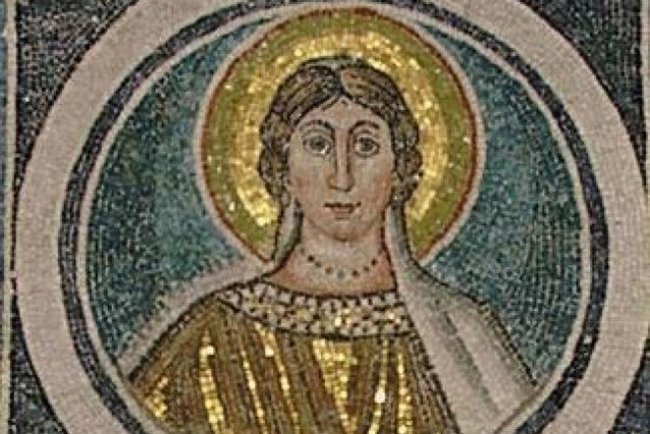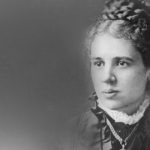
Many men and women in the early church courageously faced martyrdom. Vibia Perpetua was one of those women, and her example stirs us today.
By Susie Hawkins
“The blood of the martyrs is the seed of the church,” wrote Tertullian, an early church father.
The first three centuries of the first millennium in the Roman Empire were filled with suffering and death for followers of Christ. The Romans perceived Christians as a threat to “Pax Romana,” the Roman peace that prevailed across the empire at that time. Because Christians did not sacrifice to the pagan gods, the Romans feared the Christians’ rejection of their deities would result in punishment for the empire, which was already crumbling. Following in the footsteps of Stephen, the first martyr of the early church (Acts 7), these men and women courageously faced death, declaring their allegiance to Christ their Lord.
Christianity spread rapidly through the empire, capturing the hearts of men and women of every race, social status, and class. Vibia Perpetua was one of those women. And her example of faith still stirs us today.
Perpetua’s writings
There is not a great deal of information on women in early Christian history. They were generally illiterate, so there are few diaries or journals we can draw information from. But the story of Perpetua and her servant, Felicitas, is verifiable, due to Perpetua’s own journals and those of others martyred with her.
The first-hand account of early church martyr Vibia Perpetua is one of the earliest surviving texts written by a woman. Click To TweetPerpetua was from an aristocratic family in Carthage, North Africa, highly educated, and fluent in Latin and Greek. She was married and had an infant son when she died at twenty-one. Her rare first-hand account described her time in prison, her various dramatic visions, and her conversations with her father, brother, and prison companions. These writings were all confirmed by the testimony of Saturus, a prison companion who was martyred with her and who also recorded the events of that time. Translated in several historical documents, Perpetua’s is one of the earliest surviving texts written by a woman.
Faithfulness in prison
In 202, Emperor Severus decreed it was illegal to convert to Judaism or Christianity in the Roman Empire. Soon after that, officials arrested several converts to Christianity in Carthage and sentenced them to prison. Among them were Perpetua and her servant, Felicitas.
After Perpetua’s arrest, her aged father visited her in prison on more than one occasion, pleading with her to renounce her faith and return home to her loving family and her infant. He and her brother begged her to consider how her death would affect her family. And she replied: “…Nor can I call myself anything else than what I am, a Christian.” While she carried the identity of Roman citizen, daughter, wife, mother, and educated woman, she adamantly saw her primary identity as “Christian.”
“While she carried the identity of Roman citizen, daughter, wife, mother, and educated woman, Vibia Perpetua adamantly saw her primary identity as ‘Christian.’” — @SusieHawkins1 Click To TweetDespite the pleading of various officials and her own father, Perpetua would not recant her faith. It wasn’t long until she was placed in a dungeon and understandably became very despondent. She wrote, “I was very much afraid because I had never felt such darkness. O terrible day … I was very unusually distressed by my anxiety for my infant.”
Two deacons succeeded in getting Perpetua and Felicitas into a better part of the prison and received permission to bring her baby to her, which was an immense comfort. While in prison, she had a vivid dream. She and her prison companions interpreted the dream to mean that they would all be martyred. Eventually, she turned her infant over into the care of relatives.
Preparing for martyrdom
Felicitas, Perpetua’s servant girl, played a large part in her story. She, too, had converted to Christianity and was determined to accept God’s will for her life, even if it meant death in the arena. Both women were concerned because Felicitas was pregnant when officials arrested her. One month before she was due, she realized Rome would delay her martyrdom because it was against the law to execute a pregnant woman.
She and her companions prayed that her labor would be early so she could give her child to relatives and she and Perpetua could die together. According to her, immediately after this prayer she went into labor and gave birth to a daughter who her sister would raise. Three days later, this small group prepared for their deaths. For their last meal, they celebrated, as best they could, an agape feast (a regular observance of the early church).
By eyewitness accounts, the two women faced their deaths bravely. A mad cow had been prepared for release in the arena. And they expected death to come quickly. But as the women were led in robes into the arena, the crowd was horrified to see that Felicitas had milk dripping from her breasts, due to having just given birth. This repulsed even the hardened Romans. And officials recalled the two women to dress them in more modest gowns.
Once again entering the arena, Perpetua and Felicitas gave each other the kiss of peace so their martyrdom would be complete and prepared themselves for the animal’s attack. The other victims were killed by the sword. But the cow attacked Perpetua and then a soldier approached her with his sword. She took the sword and guided it to her throat, dying immediately.
Continued witness
The two women met their deaths in March 203. The account of their martyrdom spread like wildfire through the empire. The Romans were sickened by the gruesome murder of these two young women. Drawing from these and other martyrs’ deaths, Tertullian wrote, “O brave and blessed martyrs, you have gone out of prison rather into one. Your dungeon was full of darkness, but you yourselves are light. Your dungeons had bonds, but God has made you free.” According to Diana Severance, there are records of approximately 950 martyrs before 313 AD. Of these martyrs, 170 were women who bravely met great physical suffering in order to not deny their Lord.
Of the approximately 950 records of Christian martyrs before 313 AD, 170 are women. Click To TweetThere is no doubt this was a historical event, not some kind of myth or legend. A basilica was built in Carthage several years later, dedicated to Perpetua’s memory. And the anniversary of her martyrdom became part of the Roman church calendar.
The account of the women’s valiant deaths proved to be extremely encouraging to other believers who were facing similar fates across the empire. Their courageous suffering demonstrated the supernatural power of this new Christian faith and led the way for many others who would follow in their footsteps.
The story of Perpetua and Felicitas is a reminder of the persecution that is taking place across the world today. In closed countries, believers are subjected to all sorts of torture due to their faith in Christ. May we remember to lift them in prayer and never underestimate the powerful witness of even one life sacrificed for the cause of Christ.
Other women in church history articles:
For permission to republish this article, contact Marissa Postell Sullivan.

Susie Hawkins
Susie lives in Dallas and has been actively involved in ministry as a pastor’s wife, teacher, and volunteer. A noted author, Susie holds a Master of Arts in Christian Leadership and a Master of Arts in Theology from Criswell College.









